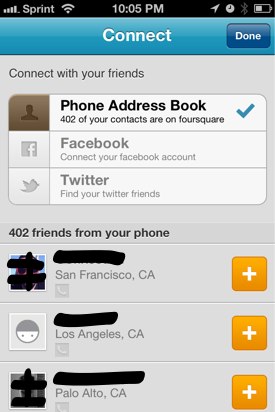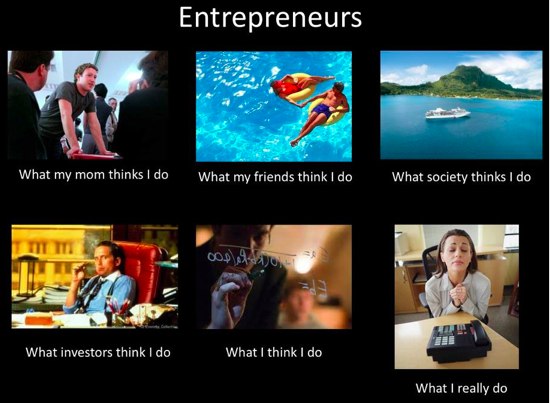I’m rarely surprised by the things I read from the tech press any more, but this ongoing Path story has definitely surprised me.
Partly because I’ve never seen a single company take such a staggering hit for doing something that, while wrong, is quite clearly industry practice. If you’ve used a mobile social app that suggested friends to you, it almost certainly uploaded your address book, and almost certainly did it without your permission.
As a user I’m slightly annoyed by this, and I think the apps doing this should be publicly criticized. But I think all of them should, not just one of them.
Normally all of them would be. There are two reasons why only Path is taking the hit.
First, because it’s not easy for tech writers to figure out who’s doing it, so they just criticize the one that everyone knows did it.
That ones obvious. But I was taken aback today when I spoke to a journalist who’d criticized Path. I asked why he just attacked them, not the others. His answers – “CEO Dave Morin is really arrogant and touchy.”
I said “wow, that’s a quote for my next story,” and he freaked out. I think just then he realized how awful it was.
The press is doing a good thing by publicly airing this. Apple may change its policies, and the apps are certainly falling into line.
But to focus on one company because you think the CEO is arrogant (which probably just means you’re upset that he’s well known and wealthy), is atrocious. And to just focus on one company because you don’t want to take an hour and download the top 50 social apps to discover that all of them are also doing this is pathetic.
On a related note, I just read one of the most vicious personal attacks I’ve seen on me, and I’ve seen a lot over the years. Dan Lyons suggests that my defending Path on this issue means, because we’re an investor, that we’re a paid apologist (and much worse). He calls my partner MG Siegler “a mean-spirited, egomaniacal buffoon who is not very bright.” But he never talks about is past issues with MG, or how thoroughly MG has discredited him.
Dan Lyons is a friend – or was. I spent a half hour on the phone with him a couple of weeks ago at his request to explain how venture funds work because he didn’t really understand it. He asked to work at TechCrunch multiple times over the years, too, although his salary requirements made that impossible.
The only reason he would write such hateful stuff is because he can’t help it. Journalists freak out when the truth is told about their industry. What MG wrote in the second half of his post yesterday was completely correct – the industry is a mess and unable to really change.
Most journalists don’t like other journalists much, but when the group is attacked as a whole they galvanize quickly. Antibodies kick in and they just can’t help themselves. They immediately move to the most disheartening personal attacks you can imagine. I don’t even think they realize quite why they’re doing it.
Lyons paints our actions in the worst possible light.
He doesn’t point out that Path was less than thrilled by my post telling them they needed to delete the data.
He doesn’t point out that I’ve repeatedly defended Facebook over privacy slipups, and I’m not an investor.
Or that I defend companies like Zynga (also not a shareholder) when I see the press massing to attack them unfairly.
Or that I was merciless in attacking the gaming industry when I saw how they were scamming users.
Or that I criticized Airbnb (where we are investors) heavily for the trashed apartment issue last summer.
Or that I got in a very public fight with Paul Graham over the Airbnb issue, and Paul Graham may be the single most important person not to piss off when you’re an angel investor.
He says that our insanely over subscribed venture fund is just a joke. He says our work at TechCrunch over the last six years is a joke. He says MG is a joke. He drags Pando Daily and Techmeme into the fight and trashes them too.
I’m surprised that my mother wasn’t mentioned, frankly.
If I was the person that Dan Lyons says I am, I would be a psychopath. I don’t understand why he wouldn’t even consider the fact that I’m simply speaking my mind. That I’ve always just spoken my mind. That I’ve never been the type of person to not speak my mind. There’s no way to look at my record and think that I am somehow a “hack for hire.”
Further, if he had any real sense of how Silicon Valley works he’d understand that, if the story he paints about Path were true, most of it’s employees would have walked out in disgust and be talking to the press. It just isn’t true. This startup scene is far less about money than tech press thinks it is. Startups are often careless, or too rushed, or just dumb. But I rarely see truly evil behavior from them.
We cannot, as a community, be ok with people being utterly trashed as individuals just because they say something counter to the prevailing wisdom that day. But in fact we celebrate it. Some of us can take it and carry on (I’ve lasted this long, I can handle it, and MG is a lot tougher than me). But it’s too heavy a cost for doing nothing more than writing what you think.
I think Path is being treated vastly unfairly. I think Apple is being given a pass and other startups and being protected. I may be right, I may be wrong. But I should be able to say that without being accused of being not just unethical but basically worthless as a human being. We all deserve that.
As a final note, I’m not trying to play the victim card here. I not particularly emotional over Dan’s article, which is part of the problem. It’s just another day in the tech world. I think we can do a lot better.
ps – I know that I have at times in the past written things that I regretted later. I remember this post, way back, about Blaine Cook. A few months later I was talking to someone and they said that I had lowered myself by mocking him. I agreed and I made a conscious decision to try not to do that again. The funny thing is I haven’t read that post in quite a while. The way I remembered it I was really out of line. But really, that post wouldn’t even raise eyebrows today. Times sure have changed.
Update: MG’s post on this. I’m starting to understand that this was all just some sad attack based on Lyons’ past issues with MG.
Update: See Foursquare Also Trying To Kill Egyptian Dissidents.
 Most of us have memories as kids of raising hell around the house. My mother, being the nurturing and kind person that she is, had little real recourse. Except the one thing. And it didn’t even matter if she said it every day, it worked.
Most of us have memories as kids of raising hell around the house. My mother, being the nurturing and kind person that she is, had little real recourse. Except the one thing. And it didn’t even matter if she said it every day, it worked.  The tech journalists don’t seem all that eager to look at the
The tech journalists don’t seem all that eager to look at the 

 Don’t get mad at companies because they apologize so quickly. It’s the only way to survive in the Internet.
Don’t get mad at companies because they apologize so quickly. It’s the only way to survive in the Internet. The
The 